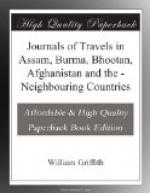Myrung is certainly far superior in every point to any place that we have yet seen; and, as the climate is peculiarly fine and the bungalow good, the degree of enjoyment is as great as can be expected. The features of the country are similar to those of Mumbree. The groves or woods are composed chiefly of oaks, intermixed with Magnolias, which attain a very large size. These forests seem all to have a northern aspect. Orchideae abound in these woods, and so far as herbaceous forms go, European vegetation is on the decrease. From the bungalow one has occasionally a remarkably fine view of the Himalayas, mountains intercepted by large tracts of very high land, probably Bootan. The coldest weather we have experienced here was when the thermometer sank to 46 degrees; even in the middle of the day the sun is not oppressive. It is singular enough, that the first attempts, so to speak, at a Fauna occur here. The woods abound with small birds. I shot one squirrel, with a very short tail and rounded head. Red deer (the Gyee of the Burmese) occur, though rarely. Two or three solitary snipes may be found during a day’s excursion, and perhaps a brace of quail, which are nearly as large as English partridges. Pheasants are reported to occur in the woods. I should add, that both here and at Nunklow snipe of a very large description, and of the habits of the solitary snipe, are found in small numbers. They are very brown, as large as a wood-cock, and their cry is that of a common snipe. Lieutenant Townsend informs me, that these birds are a totally distinct species. Lieutenant Vetch tells me, that the Khasiyas declare that they are the females of the wood-cock, in other words, wood-hens, and that in March wood-cocks abound in the places with these wood-hens. He likewise informs me, that the only difference he could ascertain to exist between these birds and wood-cocks, consists in their having very short and thick legs.
I have seen two of this particular description, but have never shot any.
[View from Nunklow: p8.jpg]
After Myrung one can speak much less in favour of these hills. Nunklow is a pretty spot, and commands a really magnificent view of the Himalayas, of the Bootan mountains, and of the plains of Assam. Altogether this view is the finest which, in my limited experience, I have ever seen: I did not however like Nunklow, nor do my wishes recur to it. {9} The route thither is pretty enough, and not fatiguing. I may mention Nunklow as the station of some fine




